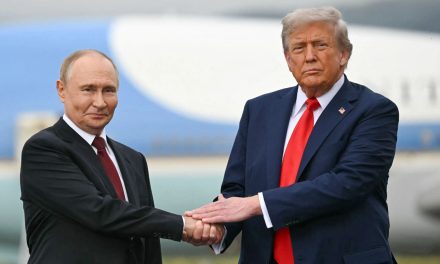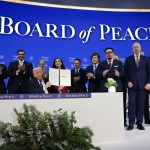
Xi Jinping Warns Trump

After Donald Trump’s 2024 victory, Chinese President Xi Jinping swiftly reached out with a mix of congratulations and caution. His message was clear: if the United States pursues confrontation over cooperation with China, both countries—and potentially the entire global economy—stand to lose. As Trump signals plans to renew his trade war with tariffs reaching up to 60% on Chinese goods, Xi’s warning of a “lose from confrontation” scenario has ominous undertones.
Xi’s Warning: “No Winners” in a Trade War
In their call, Xi highlighted a stark choice: work together for stability or face consequences in a fractured global economy. “History tells us that both countries stand to gain from cooperation and lose from confrontation,” Xi stated through China’s foreign ministry. He underscored the need for “mutual respect, peaceful coexistence, and win-win cooperation,” emphasizing that a healthy relationship between the two superpowers is vital not only for their own citizens but for the world.
Trump’s rhetoric on the campaign trail has focused on reshaping trade policies to favor American workers and reduce reliance on Chinese manufacturing. He has proposed tariffs as high as 60% on Chinese imports, a move that could severely disrupt China’s economy, shrink its GDP, and impact its position in global trade. Yet economists and experts argue that such drastic measures would likely backfire, dragging down both economies in a bitter standoff.
Tariffs: Economic and Social Fallout
If Trump proceeds with these tariffs, the consequences could be severe. China currently exports around $500 billion worth of goods to the U.S., representing a significant chunk of its economy. Estimates suggest that a 60% tariff on Chinese products could reduce China’s exports by $200 billion, potentially triggering a one-point drop in its GDP. China, already grappling with slowing economic growth and deflation, would feel the squeeze—though the impacts could reverberate back to the U.S. as well.
A trade war of this scale would disrupt global supply chains, hike prices for American consumers, and hurt the U.S. industries that rely on Chinese imports. Additionally, it would likely lead to a prolonged slowdown in global markets, leaving both countries with bruised economies. For China, a nation already facing economic struggles, the situation could spiral into even deeper instability. Mainland China and Hong Kong stock markets have already reacted negatively, dropping as Trump’s win became apparent, hinting at the fears of long-term economic strain.
Xi’s message suggests that Beijing is not only preparing for economic hardship but is also ready to retaliate. The Chinese Communist Party, which Xi leads, is reportedly planning a large-scale stimulus package to stabilize China’s economy. In recent years, China has deployed similar economic responses to shore up its financial system in times of trade tension. However, the nation’s slowdown, coupled with U.S. tariffs, could push China into uncharted territory economically, and the government will likely resort to countermeasures with serious repercussions for American industries.
Retaliation from Beijing: A Strategic Response
China is unlikely to back down without a fight. During the last trade war, Beijing retaliated with carefully targeted tariffs and restrictions, focusing on sectors that hit Trump’s voter base. If tensions rise again, Xi has multiple economic levers at his disposal. China could limit or block imports of American agricultural products, crippling a U.S. sector that depends heavily on Chinese consumers. The agricultural community, already impacted by fluctuating markets and global warming, could face devastating losses.
Another area where China could strike back is the critical minerals and technology sectors. China has increasingly restricted the export of rare minerals vital for American industries, including defense manufacturing and electronics. Any additional export controls on these materials would severely impact the U.S., slowing down production in sectors from military defense to consumer electronics. China’s control over these resources gives it significant leverage in a trade war, with repercussions for industries and consumers alike.
Furthermore, Beijing could target U.S. companies operating within China, imposing strict regulations, inspections, and taxes. Major corporations such as Apple, Starbucks, and Tesla, which rely heavily on Chinese consumers and factories, could face significant setbacks. For these businesses, a trade war could mean more than just reduced profits—it could threaten their operational stability and future growth in one of the world’s largest markets.
Tensions with Taiwan: A Powder Keg of Trade and Security
Beyond trade, the relationship between the U.S. and China is also complicated by the issue of Taiwan. Trump’s stance on Taiwan has been one of firm support, and during his previous term, his administration deepened ties with the island nation despite China’s objections. Taiwan, a major tech manufacturing hub, could play a critical role in any U.S.-China trade conflict. If tariffs on Chinese goods skyrocket, Taiwan has already announced plans to support its businesses in moving production out of China, reducing the island’s economic dependency on its powerful neighbor.
China’s response has been to ramp up military activity around Taiwan, signaling a willingness to exert pressure if tensions over trade and sovereignty worsen. The increased presence of Chinese military forces near Taiwan, coupled with the economic threats, indicates that China is ready to defend its interests aggressively. As Taiwan takes steps to reposition itself amid a potential trade war, it further strains an already fragile balance in the region.
The Global Impact: A Crisis in the Making?
The implications of a new U.S.-China trade war extend far beyond the two countries’ borders. Both economies play dominant roles in global markets, and their conflict could lead to disruptions in the flow of goods and services worldwide. For European nations and emerging markets that depend on stable U.S.-China relations, a prolonged economic standoff could mean slower growth, unpredictable supply chains, and inflation spikes. The already uncertain economic climate, exacerbated by recent geopolitical tensions, could plunge into further instability as a result of this trade war.
The coming months will be a critical test for U.S.-China relations. As Xi warned Trump, “It is hoped that the two sides will…find the right way for China and the United States to get along with each other in the new era.” While Xi’s words offer a pathway to cooperation, his message also holds a stark warning: that a failure to resolve these issues peacefully could lead to a long, damaging period of confrontation that neither country, nor the global economy, may easily recover from.
ACZ Editor: Xi realizes he is no longer making unilateral plays much to the detriment of the U.S. Trump will begin to counter the illegal and unethical activities, the spying, the blustering, the theft and more. But China and the U.S. are massive trading partners, and problems will that trade will cause problems on both side. Trump’s trade team had better be a good one.

























Hmmm, Xi trying to get out in front of it all. Problem for Trump is that he pretty much promised tariffs on China. Trump’s administration slogan is “Promises made, promises kept.” I wonder what he will do not. I still think decouple critical products like medical supply, pharmaceuticals, etc. And we will still have to rethink where to get rare earth minerals. First thing Xi will do will be to not purchase our farm products. I am surprised the article did not mention Musk and Tesla along with Apple.
Trade wars hurt everyone. We must find other ways. At lease we must insulate ourselves in key sectors before any tariffs are levied.
Remember China has already been thru one round with Trump where Trump tried his verbal strong arming but lost in reality. China is not wrong in trying to set boundaries and establish a firm understanding. The US, with its hegemonic and imperialist ideology, has been having a hard time in accepting its loss of international power. But as with all bullies it is not adjusting to a more humble and sharing ideology. Americans need to learn that the high level of existence in this country has been due to the thievery of resources from the rest of the world and that world has been formulating a strong rejection of such abuse.
Wow, guess you are 100% pro china and/or anti-American. That is OK though, your commentary is welcome. Thievery of resources? America has done more to pull other countries out of poverty than any thing or any body in history.
Have a listen to this, let me know what you think. Its old, but our record extends to this day. https://www.youtube.com/watch?v=z4i3LmR0K74
I agree with you on this one Joe. Sounds right from the South China Morning Post. I think on the balance scales the USA would come out as a good nation.
Daniel, the biggest fear Xi has is that Trump might be able to settle things in Ukraine. They fear Trump being Putin’s off ramp and any form of budding bromance. Xi is anticipating Russian military being severely degraded. This will allow him to be in position to dictate some terms to Russia down the road for the recovery of Manchuria, AND, will allow him greater gains in the arctic energy race where the USA is horribly behind. Xi views any positive relationship between him and Putin as bad for China because the great “partnership without limits” already is showing cracks, and Trump would be a huge crack. China fears the USA and Russia getting friendly again. The people also fear this because when this happens, the CCP gets more paranoid and takes it out on the people with all kinds of ridiculous arrests. Trump is in their national psyche even though Trump lost the trade war. The trade war still hurt them when combined with their Covid three year economic shutdown.